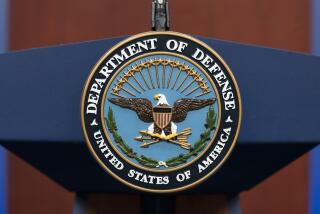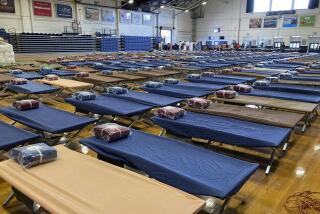Pentagon tightens interrogation rules
- Share via
WASHINGTON — Further tightening rules meant to prevent the abuse of detainees, the Pentagon has issued a new policy directive requiring that interrogations of prisoners be monitored, even if questioning is being carried out by another government agency.
Under previous rules, non-Pentagon interrogators were required to follow strict rules in the Army Field Manual when questioning prisoners at military facilities. But the new directive adds a requirement that those sessions be observed by military officials.
“If the monitored party does not adhere to DoD [Department of Defense] policies and procedures, the monitor shall immediately terminate the interrogation,” the directive says.
Under former Defense Secretary Donald H. Rumsfeld, Pentagon intelligence officials allowed prisoners under their control to be questioned by CIA interrogators and foreign officials without observing the sessions in progress.
But James R. Clapper Jr., the intelligence undersecretary chosen last year by Defense Secretary Robert M. Gates, has embraced calls by other Pentagon officials for extensive oversight.
“You can have all the training in the world, but if you let other folks in the henhouse, that’s not good,” said a military officer. The officer requested anonymity when discussing the internal debate behind the directive.
The new policy establishes restrictions on the use of defense contractors in interrogations. It also requires that contractors follow the same rules, and states that they could be prosecuted for harming detainees or improperly conducting interrogations.
The directive restates some prohibitions adopted earlier as the Pentagon has moved to curtail detainee abuses. For instance, it explicitly prohibits the use of dogs in interrogations and bans techniques taught at the U.S. military’s survival schools. The survival school techniques, based on Chinese torture methods, formed the basis for some of the harsh interrogation practices that have been used by the CIA.
Tom Malinowski, the Washington advocacy director of Human Rights Watch, said that although the new directive was useful, the Army Field Manual and Detainee Treatment Act already prohibit the military from using those techniques.
A Pentagon spokesman said the new directive “reinforces the requirement for humane treatment.”
The bulk of the 21-page directive represents a “housekeeping” change, said Charles Stimson, a former Pentagon official and a Heritage Foundation scholar.
It also lays out more extensive rules for taping interrogation sessions, whether conducted by military or nonmilitary officials, he said.
The new policy encourages but does not require all sessions to be taped. Stimson said that recording interrogations makes sense but that “it remains to be seen” if more recordings are made as a result of the directive.
The directive also prohibits the destruction of any recording that “contains any credible evidence of a suspected or alleged violation.” The CIA acknowledged last year that it had destroyed tapes showing interrogations of suspected terrorists. The tapes showed detainees being waterboarded, a simulated drowning technique that critics say is torture.
Stimson said he believed the new rules would go a long way toward preventing the Pentagon from improperly disposing of recordings it makes.
--
More to Read
Sign up for Essential California
The most important California stories and recommendations in your inbox every morning.
You may occasionally receive promotional content from the Los Angeles Times.









